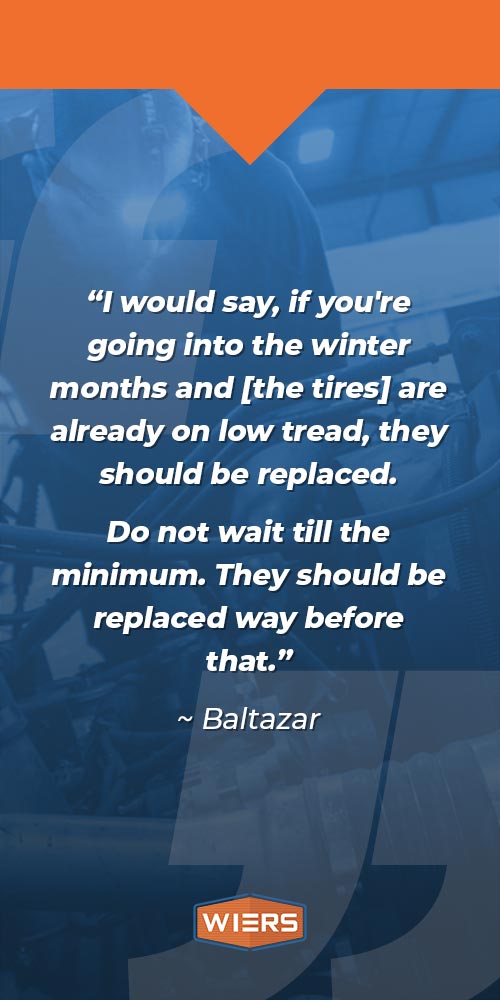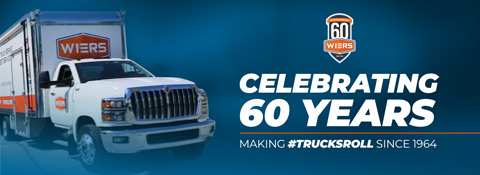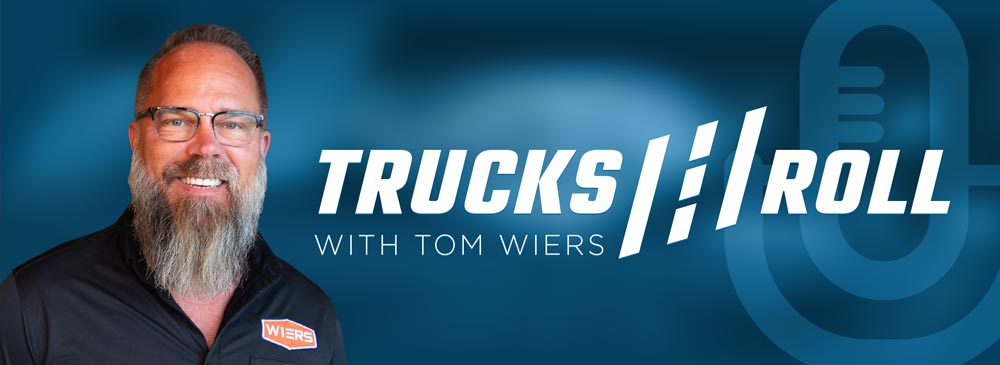
The Importance of Winterization – Trucks Roll Episode 15
Is winterizing my truck really that important?
In this special episode of the Trucks Roll Podcast, Tom stops by the Wiers Indianapolis service center for a caht with the service manager about winterization and how to keep your trucks on the road this winter. Listen in as they discuss the Wiers Winterization process and some real-life examples of why it’s so important.
In this episode you’ll learn:
- The importance of winterizing your commercial trucks.
- The steps that Wiers takes to inspect your vehicles.
- Recommendations on how often certain maintenance items should be performed.
Find out about our discounted winterization inspection cost and how Wiers makes your #trucksroll.
Here is the transcript for Trucks Roll Ep. 15:
Tom – Hi, welcome to the Trucks Roll podcast. I’m Tom Wiers, and today I’m in shop. I’m in Indianapolis at our service center. And with me today is Baltazar. He’s our service manager. And we’re going to take a few minutes to walk through the winterization inspection. It’s that time of year we’re getting ready for the cold winter to start hitting us, and it’s really important that we take time to take care of our trucks before that happens. So we’re going to do a little walk around. Baltazar is going to use his expertise to help us understand why this is so important.
Hi, welcome to the Trucks Roll podcast. I’m Tom Wiers, and today I’m at our Indianapolis Service Center and we’re going to talk about winterization and why is winterization important? So some of our customers are very strict and frequent intervals. So maybe four to even as many as six times a year. And if that’s the case, you’re probably in good shape as it relates to winterization because it’s being done as part of the preventive maintenance. But other customers who don’t use their units quite as much are on premium intervals that could be as little as once or even twice per year.
And for those types of applications, it’s really important to think about winterization. Good winterization inspection takes about 60 minutes, so it’s basically one hour. But the ramifications and the help and the impact can be really profound. So when I think about winterization, I think about, you know, identifying problems and issues in the shop on our on the customer’s time versus when it’s out on a delivery or perhaps the driver comes in the morning and the vehicle won’t start. So chronic problems as it relates to cold temperature can be, again, no-start issues.
It can be fuel gel issues. You can have cab issues as it relates to heater defrost, windshield wipers, washer fluid, all all those sorts of things that we don’t generally think of. Tires is another thing we’re going to talk about in our podcast and the importance of having good tread depth. When you think about the ability to stop in on icy conditions or snowy conditions and those sorts of things. There’s a lot of compliance issues, a lot of liability issues running commercial trucks. WINTERIZATION is an important part to make sure that we’re properly prepared with the right documentation.
So there is a situation, we’ve got our bases covered. And also it’s good for drivers, right? Nobody nobody wants to come in in the morning and jump in a truck that won’t start start the day off on a bad foot, if you will. So we like to go through a really comprehensive winterization for all of our customers. And again, if you’re doing regular four PM intervals a year, you’re probably in good shape. But if you’re not, it’s something to think about. So let’s get started with the winterization. We’re going to walk through a truck with a walk around with Baltazar. He’s our service manager here in Indianapolis, and I hope you enjoy the session.
Tom – Baltazar, why don’t we start with this particular unit? I love this truck. It’s a heavy work truck, customer unit that’s in. And we’re going to walk through this and talk about all the components that a good winterization program touches on. So Baltazar, let’s pop the hood. And our technicians are going to use our winterization form. So we’re going to walk through point by point.
All right. So the first thing we’re going to look at is the fuel water separator that’s on our checklist Baltazar why don’t you point that out and tell us why that’s so important.
Baltazar – Yeah. So if few water separator, it’s located on this vehicle, on this and this area here, it is important for us to get that checked out because a lot of times it can have excess water in the fuel system and during winter times it can also gel up as well.
Tom – Yeah, fuel contamination is a big deal. So we want to make sure that not only do we have the water out, but that we’ve got good fuel, clean fuel going through the engine.
Tom – Next, we’ll talk about the thermostat. So obviously the thermostat is going to help regulate the temperature of the engine, and that’s terribly important. You want to talk about thermostat, please?
Baltazar – That is correct, Tom. So the thermostat and this engine is located here on the top area, and it is important for us to check that, just to make sure that it is not stuck open or stuck closed. We would start the engine, get it to operating temperature and make sure everything’s operating correctly at that point.
Tom – Sounds great. We’re going to check the block heater operation. So on this particular unit, the block heater’s here, right?
Baltazar
– Yep. The connection will be there. So we’ll plug it in and test it.
Tom – So there’s actual physical testing that goes along with that. Then we’re going to check the antifreeze freeze point. And so you want to talk about what that looks like and why that’s so important?
Baltazar – We have some equipment we can use to test the coolant that’s already in the truck and make sure that it’s actually going to be good to stay in the truck or even need to flush. If we need to flush it, we recommend that flush to the customer.
Tom – Right. So we want to make sure that we have the right type of antifreeze conditions that help us throughout the winter months. Of course, there’s going to be a check of all the belts and hoses. We’re looking for anything that might be frayed or worn.
Baltazar – That’s correct.
Tom – Better to catch it in the shop environment, right, than out on the road.
Baltazar – That’s correct. Last thing a customer needs to experience as a breakdown due to a broken bell. But that’s the reason they call.
Tom – Call If they do have a break, we can help them out there, too, right?
Baltazar – That’s correct.
Tom – Hopefully that’s not the case, but we’re here for them. All right. We’re going to pressure test the cooling system. So do you want to talk about the cooling system on this?
Baltazar – Yeah. So on the cooling system, there are several hoses that go into the heater core, going to the engine block and pressure testing will let us know if there’s a leak. It could be a small leak, could be a seep, it could be a huge leak. But the pressure test, it will actually let us know if there is a leak or not. And if there is, we can advise the customer what repairs needed and then quote it and hopefully get it repaired for them.

Tom – Fantastic. I love it. So much cheaper to do it in the shop than it is out on the road.
Tom – We’re going to check the heater and defrost our operations in the cab so our technicians go in there and make sure that the heater is working properly. Windows are defrosting and then we’re going to go to the cabin air filter. Yeah. So we want to make sure that it’s getting the proper airflow. Okay. Next, we’re going to check the cab air filter. So both our shows where that’s out. So that’s and why it’s important.
Baltazar – Cab air filter on this unit, it’s located right here behind this box. I’m going to go in and remove the case.
Baltazar – And as you can see, you can actually see that it’s pretty filthy and it’s…
Tom – Right.
Baltazar – Should be replaced. It is highly recommended that we replace it.
Tom – And so besides just the airflow into the cab, does that help?
Baltazar – That’s correct.
Tom – Okay, so the air conditioning and heating are functioning properly and not being restricted. So fantastic.
Tom – Next item on, we’re going to look at the window and door seals. So.
Baltazar – Yeah. So another part of the winterization process will be for us to check the seals and check the latches, make sure we look them up. I’m sure we all experience where, you know, we try to open the door and they get stuck. It could be something as simple as, you know, the trim being either loose or not being lubed. What does checking ensure that that’s not going to happen or at least help avoid it?
Tom – Okay, fantastic. So the next thing or technicians would do is they would look at the air tanks and drain all the moisture out of those.
Baltazar – That’s correct.
Tom – Why is that important?
Baltazar – That’s important because a lot of times this air system builds up condensation, drifts during its normal operation. And in doing so, it can actually that water can freeze if the air tanks are not empty out from the water. Right. Especially in a day, cab or sleeper, where the the line’s hooking up to the trailer can actually push push some of that water into the trailer and then cause some issues where a trailer breaks or lock up the brakes on the truck lock up. And I’ve experienced that myself with some other customers.
Baltazar – That was an issue. And they had to use, you know, break and a freeze to get them freed up. And you want to get to that point because then it could damage some other stuff using this stuff as well.
Tom – Right. Yeah.
Tom – So most of the trucks will work on our air brakes, keep the moisture out of the system. Then we’re going to go to the air dryer and the and the air dryer heater operation. So on this particular unit, air drivers here, we’ll talk about why that support is kind of back to the keeping moisture in the system, isn’t it?
Baltazar – Yeah. Oh, yeah, definitely. So this should be recommended replaced in my in my opinion, from your place every six months. Some companies or customers don’t do them until a year or until they’re due. But yeah, replacing it will ensure that it’s it’s it’s cleaned out the air system from any debris and all that.
Tom – So the next two items on our list, Baltazar are checking the ultra output and load testing the batteries. You won’t talk about the importance the electrical system.
Baltazar – Yeah. So in the freezing temperatures or even just below like below 50 degrees, batteries have a harder time starting the engine or even any other components that are like a liftgate because of the lower temperatures though that’s that is the reason why they have a cold cranking amp because it’s cold weather. Yeah. So it’s it’s important for us to check the batteries, check the alternative output to make sure that the alternators working properly and the batteries are holding the charge.
Tom – Right. You know in preparation for this, I did a little research and it said that batteries lose a 60% of their of their capabilities at zero degrees. That’s correct. So, I mean, the battery life goes down quickly with the cold temperature or, the battery power, I should say. And it’s harder for the motor to start because all the the viscosity, the fluids are really thick. And so it’s more difficult on the batteries in that regard as well.
Baltazar – And the longer the weather it’s cold the even the the longer it’s…
Tom – Good point.
Baltazar – … the the the batteries have to be worn down. Right. And if they’re already weak, start into the cold weather months, they’re going to be even weaker. And then the last thing we want a customer experience is a breakdown in cold weather.
Tom – Right. Jump start. But driver comes in the morning, it’s already cold, it goes out, a strike cranks it over. Nothing’s happened, right? Drivers aren’t happy. It creates havoc for the morning. Okay. Couple other items on our checklist. We’re going to check the exhaust system for leaks. We’re going to check tire condition and pressure. And then we’re also going to inspect the wiper blades and the fluid bottle, make sure it’s full and there’s no leaks and that sort of thing. So making sure that when the driver gets on a road, if it’s inclement weather, he’s going to have a safe unit to operate and not have to take any chances. So one other thing on this particular unit, and I love these big work trucks, a lot of this particular unit’s got a crane on on it as well.
Tom – But let’s talk about the liftgate because it’s easy to think about the chassis and all the mechanical parts. But most of our customers, again, have a lot of work trucks in their fleets. This particular unit, as I said, has a liftgate. So you want to talk about why it’s important not only to do the chassis but liftgate as well?
Baltazar – Liftgates are normally not checked as they should be. They need to be lubricated. The hydraulic fluid needs to be checked to make sure it’s not low because especially in the winter months, you know, the customer can drive to the job site and then realize their liftgate’s working slow. Or maybe it’s because of a battery condition that’s, you know, they’re worn out or weak or the fluid slow. And especially in winter, it’s the battery. The hydraulic fluid gets thicker, just like engine oil, but it’s not actually being pushed at all times, like, let’s say when it’s running…
Tom – It’s sitting there.
Baltazar – Right.
Tom – Exactly. Yeah. So that’s a good point. You know, like it’s easy for us to forget about the auxiliary equipment and to your point, go out to the customer site and you got a problem and no good. Well, I think that gives our customers a good idea of what a winterization program looks like at Wiers. It’s part of our PM process if we give it a PM. But if you’re in between preventive maintenance intervals, it’s a good idea to get the truck in. It’s a very quick inspection, but worth a lot of value to our customers and make sure their trucks are are running on a daily basis.
Tom – So Baltazar now that we kind of walk through the winterization process. Any stories that come to mind as you think about this in your in your experience?
Baltazar – Yeah, my my main thing I always want to check on winterization. Is making sure defrost is working.
Tom – The defrost?
Baltazar – A lot of times the defrost of some customers. You know, companies do not realize that that’s a very important part of of a truck, especially in winter, to making sure that the windshield is clear is a for clear view for the driver is be able to drive safely right. If if it’s not working, then there’s no way for us to drive the for them to drive the vehicle. Then another store would be also exhaust. I know of a driver that dealt with exhaust fumes going into the cab because of an exhaust leak.
Baltazar – The winter months, they’re running either the APU or.
Tom – That’s a good point.
Baltazar – … or running their the front AC and if there’s an exhaust leak the engine has to be running to actually get that heat going.
Tom – So that’s a big one… that’s a big safety issue, right?
Baltazar – That’s a very big safety issue.
Tom – Someone could die from that.
Baltazar – Yes, exactly.
Tom – Yeah. But because that’s that’s interesting. You know, this is a work truck. So I generally think about this truck leaving in the morning, coming back. But obviously, we work on a lot of tractors and over-the-road trucks as well. Right. And again, those those drivers have to run those trucks longer. But just to keep the cab…
Baltazar – Yeah. Overnight. Yeah. Keeping it warm and they may not be aware they have a leak until we you know, check it out and let them know hey yeah you haven’t it needs to be fixed.
Tom – That’s a great that’s a great point. So thanks for sharing that. Anything else comes to mind as far as you know what you’ve seen customers.
Baltazar – Yeah. Tires. I, you know it’s recommended for tires be replaced. You know still tires 4/32 dry tires 2/32.
Baltazar – I would say if it’s if you’re going into the winter months and they’re already on low tread, you should they should be replaced.
Tom – Yeah.
Baltazar – You know, drive tires off 4/32. Do not wait till the minimum. They should be replaced way before that.
Tom – Right.
Baltazar – Going into winter, it’s going to get worse. And then there’s a lot of breakdowns on time and winter and all that just kind of goes into the effect where you know, it’s going to be almost impossible to get them replaced in time.
Tom – Yeah.
Tom – Yeah, that’s another good question. You know, one of the things that all of our customers have to deal with is the the legalities of running commercial trucks. Right? We all see the billboards with, you know, the hammer or whatever. Somebody’s wanting to sue one of our customers for a truck incident. So when you think about tires, I think about steering, you know, stability, drivability, brake ability, all those sorts of things are important. So it’s a good idea when you’re going into winter. Make sure have some good tires on there so you don’t have problems and end up with a hammer knocking on your door.
Baltazar -That’s correct.
Tom – Nobody wants that. We don’t want that. Baltazar, thank you so much for saving a few minutes with us, walking us through the winterization process. I think our customers can get a lot of value out of this video and appreciate all that you do for our company and our customers keeping those trucks rolling. Hope you enjoyed this Trucks Roll podcast about winterization. If you’d like to learn more, please go to wiers.com.
Trucks Roll.
Links:
- Share your thoughts and connect with us on Facebook
- Check out more videos on Youtube
- Listen to Previous Episode






